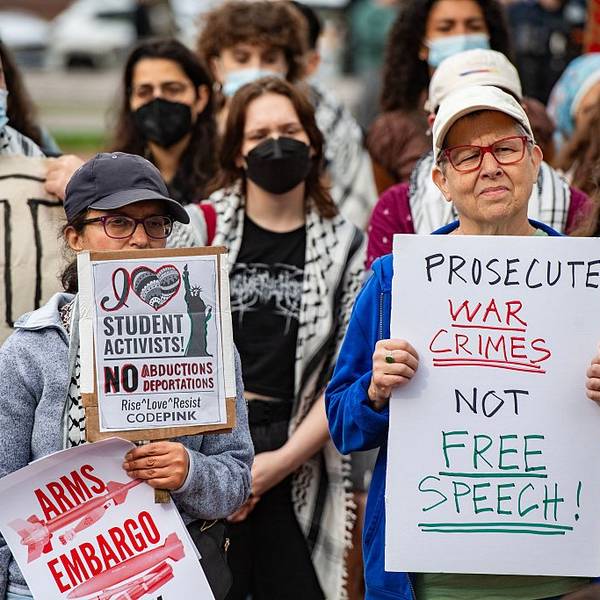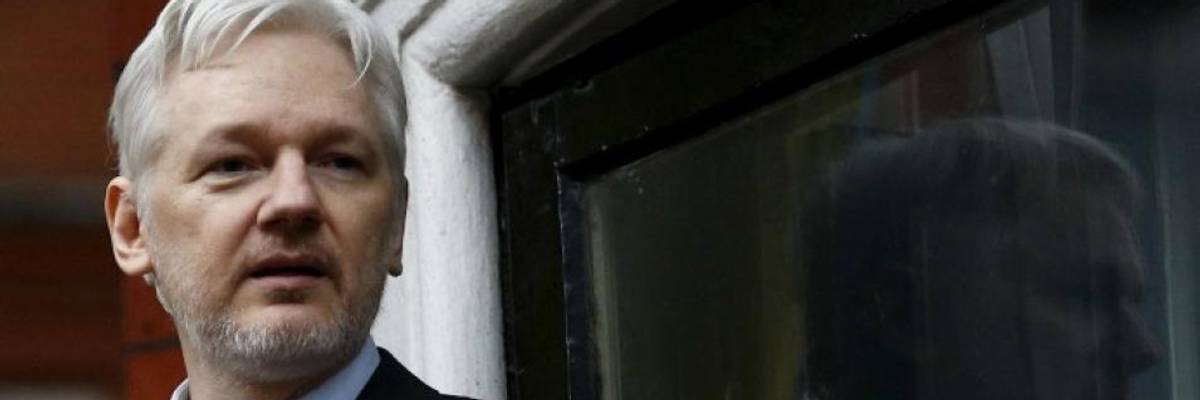Free speech advocates and civil libertarians are warning that fundamental press freedoms are under threat after the Trump Justice Department accidentally revealed in an unrelated court filing that secret charges have been filed against journalist Julian Assange.
For nearly six years, the Wikileaks founder and publisher has been living in the Ecuadorian Embassy in London to avoid extradition to the U.S. for publishing classified and embarrassing information about the global superpower.
"The government bringing criminal charges against someone for publishing truthful information is a dangerous path for a democracy to take."
--Barry Pollack, Assange attorney
"The news that criminal charges have apparently been filed against Mr. Assange is even more troubling than the haphazard manner in which that information has been revealed," Barry Pollack, one of Assange's attorneys, said in a statement. "The government bringing criminal charges against someone for publishing truthful information is a dangerous path for a democracy to take."
While it is not entirely clear how mention of the Assange charges ended up in an entirely unrelated filing, experts told the Guardian it was likely a simple copy-paste error.
Written by Assistant U.S. Attorney Kellen Dwyer, the filing calls for the charges against Assange to remain hidden from the public "due to the sophistication of the defendant and the publicity surrounding the case."
"I hope people see how precedent the Trump administration wants to get against WikiLeaks under the Espionage Act can easily be turned around and used on mainstream reporters."
--Trevor Timm, Freedom of the Press Foundation
The charges, Dwyer continued, "need to remain sealed until Assange is arrested."
Though it is not yet clear what specific charges have been filed against Assange, press freedom advocates immediately raised alarm at the dangerous prospect of an individual being prosecuted for publishing classified information--something journalists and major newspapers like the New York Times and Washington Post do all the time.
Journalist and Intercept co-founder Glenn Greenwald, in a column posted Friday morning, detailed why any prosecution of Assange for his work as a journalist would have profoundly negative implications and placed the ongoing attack on Wikileaks in the context of broader discussions of press freedoms:
Over the last two years, journalists and others have melodramatically claimed that press freedoms were being assaulted by the Trump administration due to trivial acts such as the President spouting adolescent insults on Twitter at Chuck Todd and Wolf Blitzer or banning Jim Acosta from White House press conferences due to his refusal to stop preening for a few minutes so as to allow other journalists to ask questions. Meanwhile, actual and real threats to press freedoms that began with the Obama DOJ and have escalated with the Trump DOJ - such as aggressive attempts to unearth and prosecute sources - have gone largely ignored if not applauded.
But prosecuting Assange and/or WikiLeaks for publishing classified documents would be in an entirely different universe of press freedom threats. Reporting on the secret acts of government officials or powerful financial actors - including by publishing documents taken without authorization - is at the core of investigative journalism. From the Pentagon Papers to the Panama Papers to the Snowden disclosures to publication of Trump's tax returns to the Iraq and Afghanistan war logs, some of the most important journalism over the last several decades has occurred because it is legal and constitutional to publish secret documents even if the sources of those documents obtained them through illicit or even illegal means.
"I hope people see how precedent the Trump administration wants to get against WikiLeaks under the Espionage Act can easily be turned around and used on mainstream reporters," Trevor Timm, executive director of the Freedom of the Press Foundation, wrote on Twitter. "Hard to overstate how dangerous it would be for press freedom."
"If Assange is charged by the U.S. government in relation to the Manning leak and WikiLeaks, the implications for U.S. journalism, and the chilling effect, would be extremely serious," added Christian Christensen, an American professor of journalism at Stockholm University in Sweden. "Dislike of Assange should not blind people in the U.S. to this fact."
Others echoed those warnings online, noting that all journalists--regardless of political persuasions--should immediately condemn any charges against the WikiLeaks founder for publishing state secrets as a grave threat to the press in the United States and around the world.
"Any prosecution of Mr. Assange for WikiLeaks' publishing operations would be unprecedented and unconstitutional, and would open the door to criminal investigations of other news organizations," Ben Wizner--director of the ACLU's Speech, Privacy, and Technology Project--said in a statement on Friday. "Moreover, prosecuting a foreign publisher for violating U.S. secrecy laws would set an especially dangerous precedent for U.S. journalists, who routinely violate foreign secrecy laws to deliver information vital to the public's interest."
News of the unspecified charges against Assange by the Trump administration comes amid growing concerns that Ecuador could be preparing to hand the WikiLeaks founder over to U.K. authorities, making his extradition to the U.S. far more likely.
As the Wall Street Journal reported shortly before the charges against Assange were inadvertently revealed, Trump's Justice Department said it was "increasingly optimistic it will be able to get him into a U.S. courtroom."
In a statement to the Washington Post, Pollack, Assange's lawyer, ripped the Trump administration's recklessness and echoed dire warnings about the severe threat to journalists posed by potential charges against Assange.
"Obviously, I have no idea if he has actually been charged or for what, but the notion that the federal criminal charges could be brought based on the publication of truthful information is an incredibly dangerous precedent to set," Pollack said.




